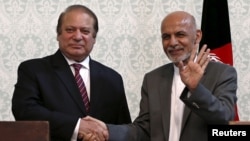Just when the peace prospects between Pakistan and Afghanistan seemed to be improving, the Taliban carried out attacks that sent a strong signal about the pitfalls in the way of lasting peace in the region. In his visit to Kabul last week, Pakistani Prime Minister Nawaz Sharif denounced the Taliban’s activities in Afghanistan and said the country's enemies could not be Pakistan’s friends.
Kabul has long suspected Pakistan of aiding the Taliban in its attacks inside Afghanistan. Such an open denunciation of the insurgent group by the Pakistani prime minister generated some goodwill between the two countries. But since then, the Taliban has carried out several attacks in Kabul.
Analysts say the attacks should not discourage Kabul from working with Islamabad.
Michael Kugelman, a senior program associate for South and Southeast Asia at Washington’s Woodrow Wilson Center, told VOA that several things led to the improvement in ties between the two countries.
“There has been some significant progress for the simple reason that Pakistani military leadership has been talking with Afghan leaders because Pakistani military leadership is more comfortable with the new Afghan government led by President Ashraf Ghani than it was with President Karzai’s government.”
Relations soured under Karzai
Under President Hamid Karzai, relations between Pakistan and Afghanistan soured as Kabul accused Islamabad of supporting Taliban terrorist activities and Pakistan blamed Afghanistan for being a conduit for destabilization in Pakistan.
But Kugelman says for the relationship to further improve, Pakistan will have to end its association with all militant groups that cause trouble inside Afghanistan. Pakistan denies it has ties to those groups and says it has a great stake in Afghanistan’s stability.
Other experts believe economic interests may have played a major role in bringing the two countries closer. In this regard, China’s role is mentioned as a key.
China recently pledged $46 billion in the region for an economic corridor that is a network of roads, railways and energy projects linking Pakistan's Gwadar port with China's far-western Xinjiang region. With such massive investment, China certainly would like to see peace in the region.
A senior Pakistani journalist who regularly writes on Afghan-Pakistan relations for the Urdu daily Jang, Salim Safi, says China is in a unique position.
“If other countries like the U.S., or Arab nations get involved in Afghanistan then others would suspect their motives, but China is the only country that is both influential and acceptable to Pakistan, Iran, Afghanistan and the Arab nations," he said.
China also is concerned that Muslim separatists from its Xinjiang province could join with militant groups operating inside Afghanistan. During his April visit to Pakistan, where the agreements for the Economic Corridor were signed, Chinese President Xi Jinping called for greater efforts to bring peace to neighboring Afghanistan.
Washington Brought Kabul, Islamabad closer
The United States also has played a role in nudging Kabul and Islamabad to establish closer ties. Some security analysts say the United States would consider it a U.S. failure if Afghanistan again becomes a launching pad for terror attacks. Therefore, they say, the Obama administration must be asking the two neighbors to learn to coexist peacefully before the last U.S. troops say "goodbye" to the war theater that kept them engaged for the longest period in American history.
“I think the United States is trying to play the role of a bridge, but as long as these Taliban attacks continue, it is going to be very difficult,” says James Phillips of the Heritage Foundation, referring to the change in relations between Pakistan and Afghanistan.
While there can be arguments for and against what external factors led to the recent warming of relations between Kabul and Islamabad, experts say the biggest motivator for the two sides to build long lasting peace should be the safety and amelioration of their peoples.
VOA’s Afghan and Deewa Services also contributed to the article.












